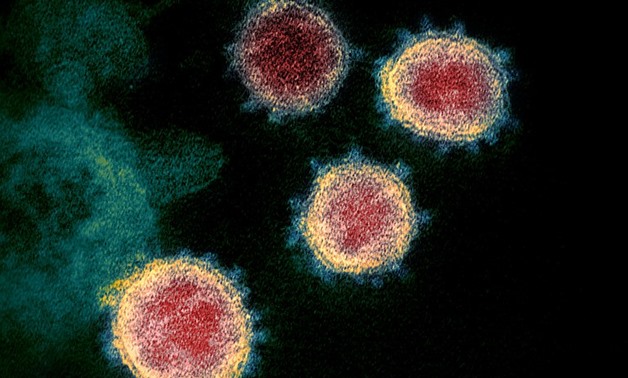
Novel Coronavirus SARS-CoV- CC via Wikimedia
CAIRO - 18 May 2020: The novel coronavirus continues to circulate the world while the cases of recovery from the virus also increase.
The world is seeking to find a cure for the coronavirus, which has so far infected about 4,836,897 people worldwide, while more than 1.8 million cases have been recovered of the disease.
Egypt Today highlights several questions related to the virus:
How long does the virus live in the body?
A study by The Lancet medical journal gives a realistic answer to this question, as reports indicate that patients with coronavirus carry the causative agent of coronavirus infection within the respiratory system for 37 days, which means they may remain infectious for several weeks after they recover from it.
Given that the current recommended quarantine period is for 14 days, the patient may remain contagious for a long time after the symptoms disappear, which leads to the virus spreading unintentionally, according to the British newspaper The Independent.
Can a person be infected with the virus again?
There are sporadic reports that some people appear to be re-infected with the new coronavirus; data from health officials in China's Guangdong Province say 14 percent of people recovering from the disease have contracted it again after being tested again.
In late February, Reuters reported that a woman in Osaka, Japan, had also shown to be positive after recovering from the virus and a similar case had been reported in South Korea.
However, there may be other interpretations in the sense that there is a possibility of an error in the diagnosis or early exit of the patient from quarantine or there may be minor inactive symptoms that have not yet appeared.
Usually, when the body’s immune system defeats a viral infection, it knows how to defeat it again, depending on the symptoms of each person’s immune deficiency.
Anthony Fossey, director of the National Institute of Allergy and Infectious Diseases, told a hearing before the US House of Representatives Oversight and Reform Commission on May 14, "We could not prove it officially, but it is highly likely that the virus will return to attack the lungs again, but if this virus works like any other virus, then once the patient recovers from it, he will not be infected again."
What are the lasting effects if a person recovers from the virus?
The Hong Kong Hospital Authority examined the first wave of patients who recovered from confirmed cases of the virus, with 131 confirmed infections and threedeaths recorded in the city, while it was announced that 74 people had been discharged from hospitals.
The medical director of the Kwai Chung Infectious Diseases Center, Owen ZangTakyin, said that doctors have already seen nearly 12 patients who went on similar appointments that two to three people were unable to do things as they did in the past, according to South China Morning newspaper.
"They are panting if they walk a little more quickly and some patients may experience a 20 to 30 percent reduction in lung function after recovery," Tsang told a news conference on May 14.
Patients are now undergoing tests to determine how much lung function they still have, and physical therapy and cardiovascular exercises will be encouraged to strengthen their lungs.
Surveys indicate damage to the tissues the lungs, but it is not yet certain whether this may lead to complications later in life such as pulmonary fibrosis or not.

Comments
Leave a Comment